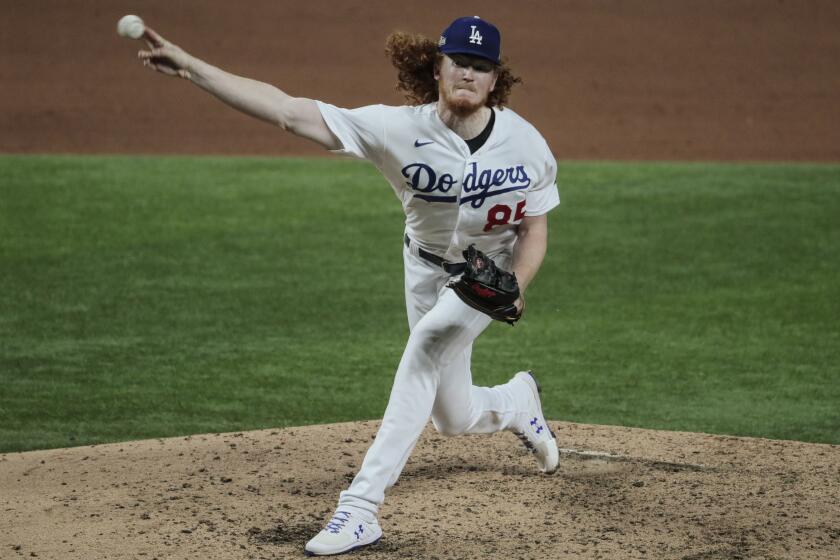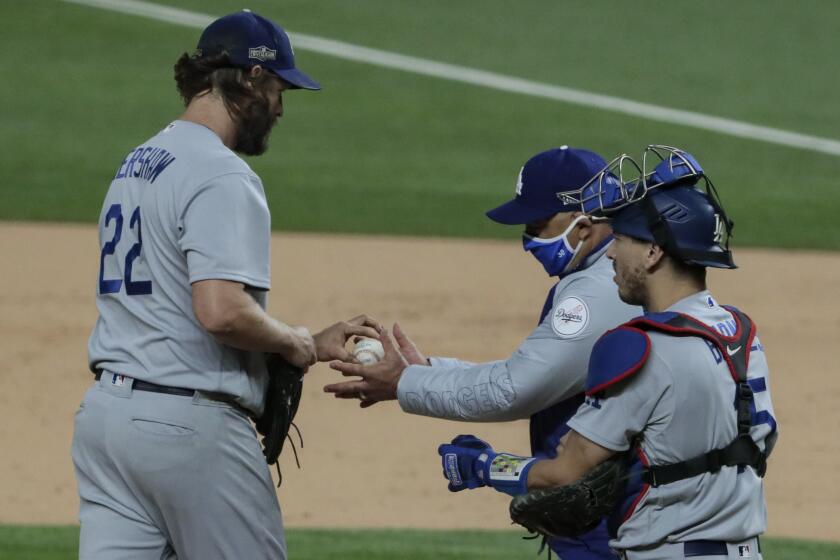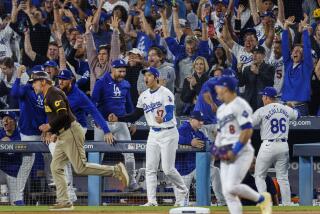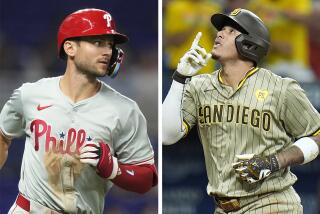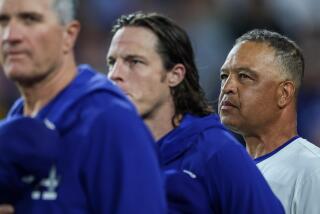Led by homegrown youngsters, Braves have the Dodgers on the brink of elimination
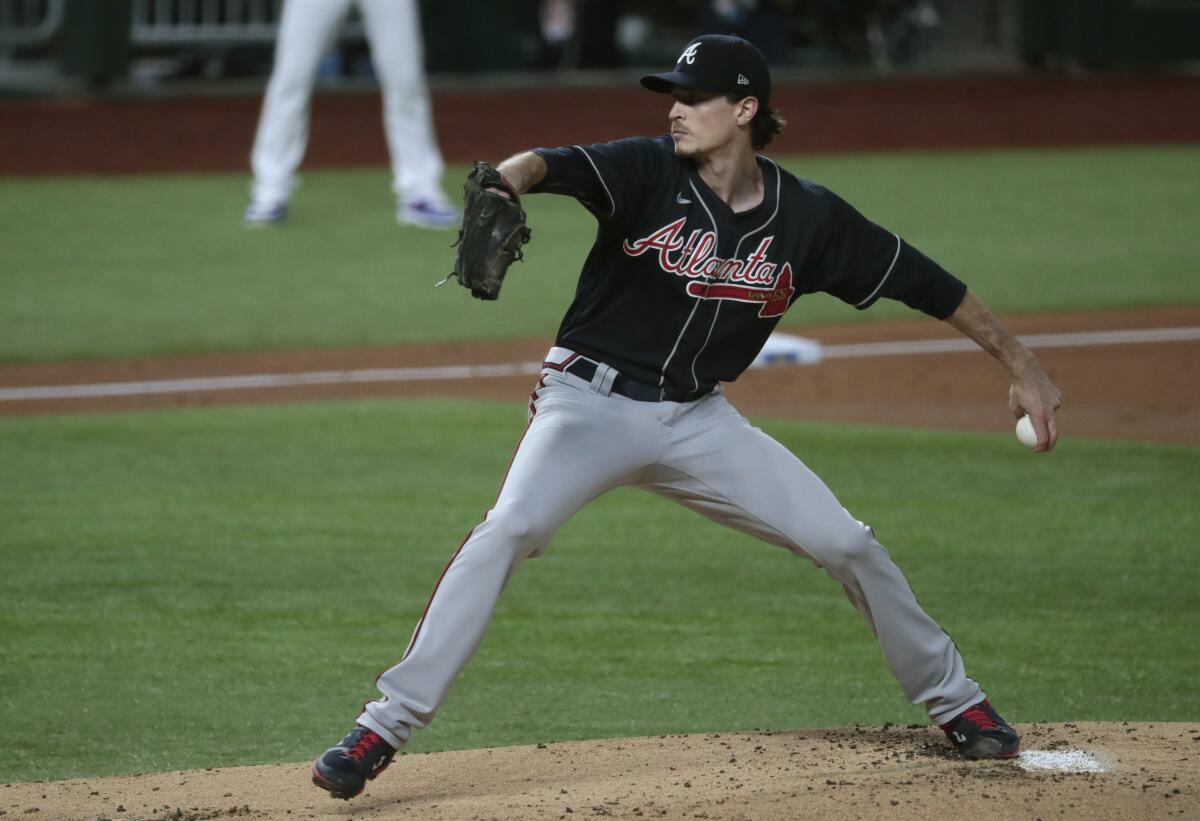
- Share via
For years, the Dodgers have wrought havoc on opponents with the help of homegrown talent. Their farm system season after season has proved fertile, ripe with prospects developed by one of the best minor league structures in the sport.
When catcher Austin Barnes’ offensives woes dragged past the All-Star break last season, the Dodgers gave his job to prospect Will Smith and watched the rookie complete his first 54 games in the majors with 42 RBIs and an eye-catching .907 OPS. He was far from the only rookie to make an impact. Alex Verdugo batted .294, the sixth-best mark among newcomers with at least 350 plate appearances. Matt Beaty ranked third in baseball in average with runners in scoring position (.379; minimum of 50 plate appearances with RISP). On the mound, Tony Gonsolin struck out 37 in 40 innings. Dustin May broke into the majors with a 3.63 ERA over his first 14 outings.
This summer, when ace Clayton Kershaw missed his opening day start because of back spasms, May stepped up again.
All those players mentioned were nurtured their entire professional careers by the Dodgers’ elite player development staff.
Dodgers manager Dave Roberts isn’t worried about having Dustin May, a rookie, pitch in Game 5 of the NLCS with the team on the brink of elimination.
Half of the players on the Dodgers’ National League Championship Series roster this week can make the same claim. The Dodgers have relied on the strength of their internal talent pipeline more often than not during their eight-year reign over the National League West.
In the NLCS, they ran into a team that has largely followed the same principles. The difference is the Atlanta Braves enter Game 5 of the best-of-seven-series with a three-to-one advantage. On Friday, the Braves have a chance to clinch their first National League pennant since 1999.
“This organization has never wavered from their scouting and player development,” said Braves manager Brian Snitker, who has been with the team for 44 years and managed in the minor leagues many of the players responsible for Atlanta’s division titles from 1991 to 2005. “It’s the lifeline of what we’re doing here.”
The Braves haven’t simply gone toe-to-toe with the Dodgers. They have put the Dodgers on the brink of elimination in spite of the historic inexperience of their starting rotation. According to Elias Sports, the Braves’ first four starters combined for 75 career starts in the regular season — the fewest combined by the Nos. 1 through 4 starters for a team in a postseason series.
The implosion of rookie Kyle Wright in Game 3, in which the Dodgers walloped the 25-year-old for seven runs, looks like a blip in comparison to the overall performances of their rookie starters both in this series and since the beginning of the playoffs.
On Thursday night in Game 4, the Dodgers were manhandled by prospect Bryse Wilson. The 22-year-old entered the game having spent most of the regular season with the team’s squad of alternates relearning how to deploy the two-seam fastball. That pitch proved vital to his one-hit, one-run effort over six innings.
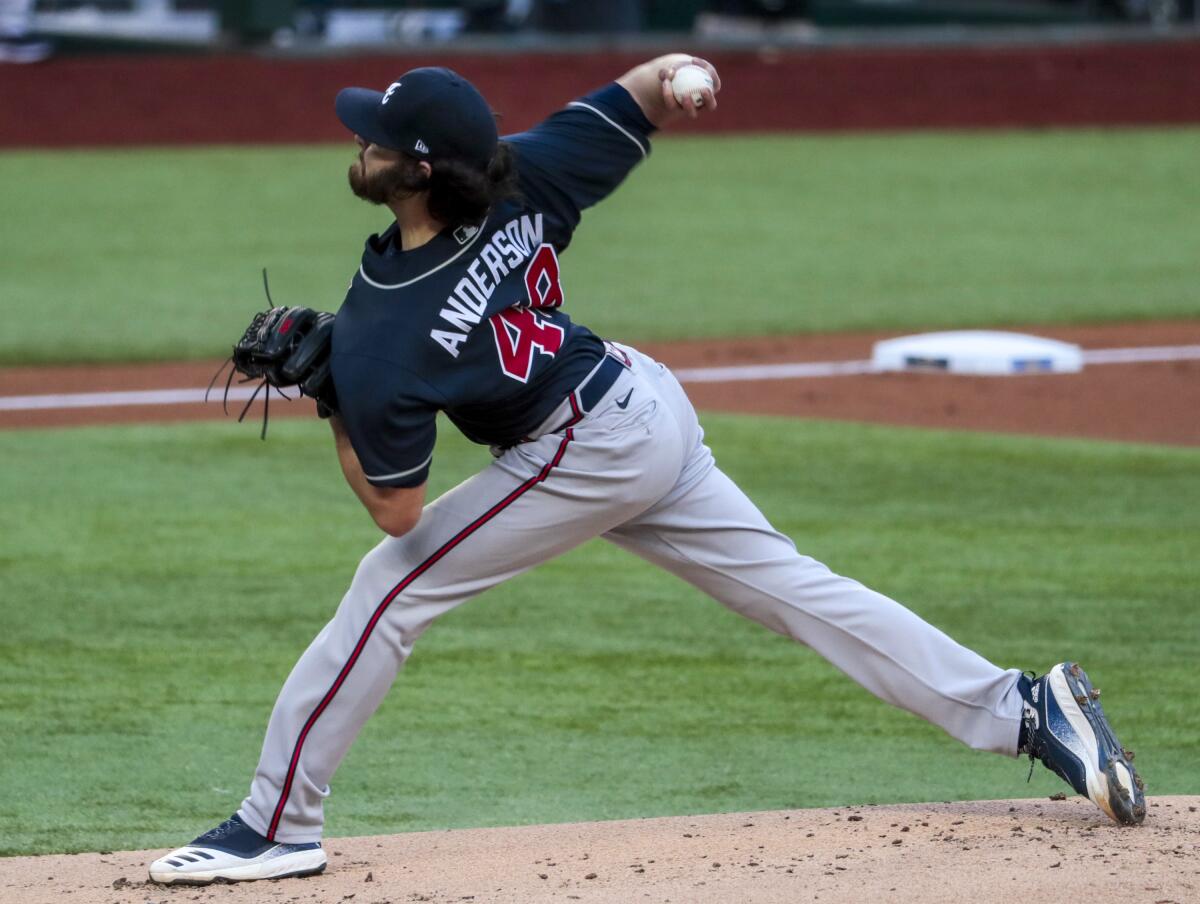
Two games earlier, rookie Ian Anderson held the Dodgers scoreless despite pitching with men on the bases in three of his four innings.
In the series opener, Harvard-Westlake High product Max Fried struck out a postseason-high nine batters. Fried isn’t a rookie but Monday marked only the third time in his career the 26-year-old had started in the playoffs.
Clayton Kershaw’s struggles in the sixth helped the Braves win Game 4, but the blame for the loss runs through the batting order and into the front office.
Fried, Anderson, Wilson, and Wright have pitched to a 2.58 ERA (13 earned runs in 45 ⅓ innings) this postseason. Remove Wright’s collapse and the ERA drops to 1.21. The Braves have gone 8-1 in these playoffs and all their games have started with those pitchers on the mound.
Fried is the only pitcher of the group not drafted by the Braves, who have been run by former Dodgers front-office executive Alex Anthopoulos since the start of the 2018 season. Yet Fried, a first-round draft pick of the San Diego Padres in 2012, spent most of his minor league career in Atlanta’s farm system after joining it ahead of the 2015 season.
If the Dodgers are to overcome their series deficit, Friday provides the best opportunity. The Braves will have a pitcher not named Fried, Anderson, Wilson or Wright start for the first time in October. Left-hander A.J. Minter will start a bullpen game.
If they can’t take advantage of that gift, the Dodgers will return to Los Angeles looking a lot like the Braves of the ’90s and early 2000s — rife with ability but barren of the multiple championships they seemed built to win.
More to Read
Are you a true-blue fan?
Get our Dodgers Dugout newsletter for insights, news and much more.
You may occasionally receive promotional content from the Los Angeles Times.
